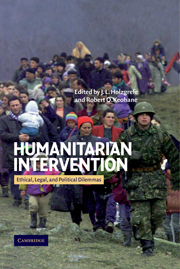Book contents
- Frontmatter
- Contents
- List of contributions
- Acknowledgments
- Introduction
- PART I The context for humanitarian intervention
- PART II The ethics of humanitarian intervention
- PART III Law and humanitarian intervention
- 5 Changing the rules about rules? Unilateral humanitarian intervention and the future of international law
- 6 Interpretation and change in the law of humanitarian intervention
- 7 Rethinking humanitarian intervention: the case for incremental change
- PART IV The politics of humanitarian intervention
- Select English language bibliography
- Index
6 - Interpretation and change in the law of humanitarian intervention
Published online by Cambridge University Press: 27 July 2009
- Frontmatter
- Contents
- List of contributions
- Acknowledgments
- Introduction
- PART I The context for humanitarian intervention
- PART II The ethics of humanitarian intervention
- PART III Law and humanitarian intervention
- 5 Changing the rules about rules? Unilateral humanitarian intervention and the future of international law
- 6 Interpretation and change in the law of humanitarian intervention
- 7 Rethinking humanitarian intervention: the case for incremental change
- PART IV The politics of humanitarian intervention
- Select English language bibliography
- Index
Summary
The letter killeth, but the spirit giveth life
St. Paul's Epistles, 2 Corinthians 3.6Non-lawyers tend to have greater reverence for the law than do lawyers, perceiving it in almost Hammurabic or Mosaic terms: written in stone and authored by supreme authority. In this, they may reflect the views of those seventeenth- and eighteenth-century legal philosophers who regarded law as the inspired human embodiment of divine wisdom and morality or of those nineteenth-century positivists who understood law to be the commands of supreme rulers.
Beginning in the twentieth century, however, law has come to be understood in less absolute and more dynamically transactional terms, as a system of norms constantly engaged in a process of challenge, adaption, and reformulation. This more contingent view of law may be merely another manifestation of the transformation of the command structure of social order that has come about as a result of political liberalization.
International law has not escaped this changing ethos. Indeed, as law in general has come to be understood less as an ineluctable command and more as part of liberal discourse – and as only one of many instruments of social stabilization and change – so, too, has the perception of international law changed. In the twenty-first century, it has become professionally respectable for practitioners of both domestic and international law, when asked whether a proposed course of conduct is lawful, to reply that, well, sometimes it is, sometimes it isn't, and sometimes it both is and isn't.
- Type
- Chapter
- Information
- Humanitarian InterventionEthical, Legal and Political Dilemmas, pp. 204 - 231Publisher: Cambridge University PressPrint publication year: 2003
- 29
- Cited by



